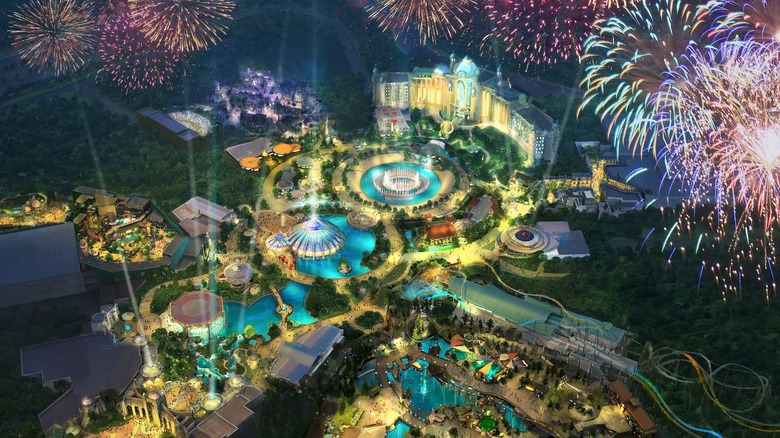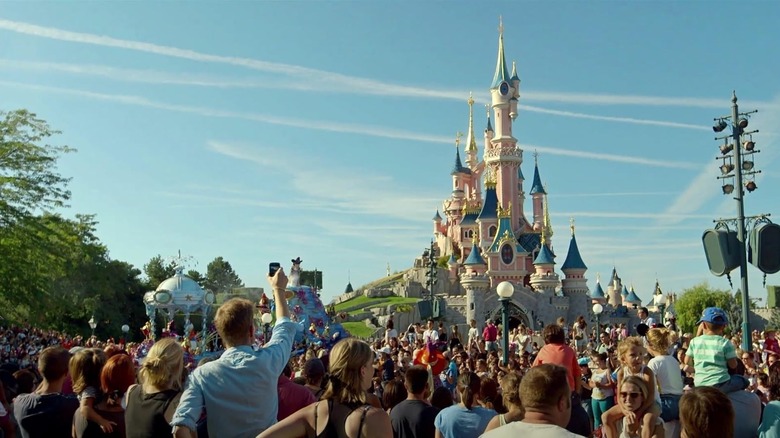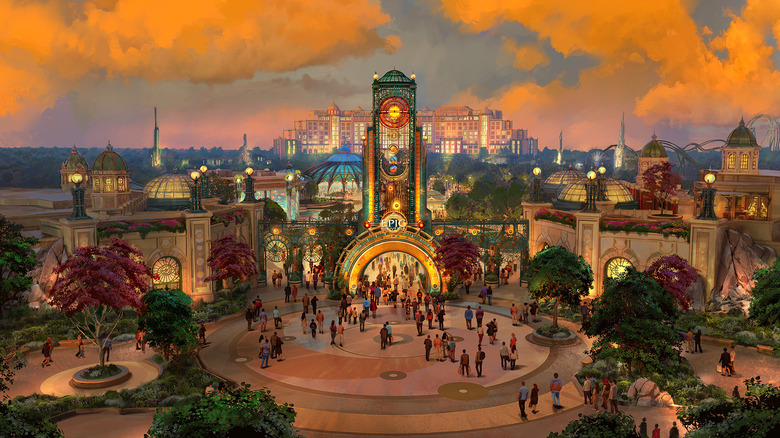Why Disney Should Be Afraid (Very Afraid) Of Universal Studios And Epic Universe
It has not been the most amazing of weeks for the Walt Disney Company's theme-park division, for two specific reasons. First, it unveiled a pilot program for something it's called the Lightning Lane Premier Pass, which enables a guest to skip the line at every major attraction at either Disneyland or Walt Disney World ... as long as you have a few hundred extra dollars per person to spare, per day and per park. Then, Universal Studios confirmed the online scuttlebutt: its newest Orlando theme park, Epic Universe, will open on May 22, 2025. Epic Universe, to be clear, isn't just some new land being added to either Islands of Adventure or Universal Studios Florida; it is an entirely new park with a handful of dedicated areas lining up with some of the biggest pieces of intellectual property under the Universal banner. Now, while the impending arrival of Epic Universe was no secret, its shift from being a work in progress to something that's a mere seven months from being a tangible reality for guests also makes it a tangible (and terrifying) reality for its competition.
In April of 2023, Disney celebrated the 25th anniversary of its fourth theme park, Disney's Animal Kingdom. What it was also doing, however, was celebrating the last time that it had opened a single new theme park in the 43 square miles that comprise Walt Disney World. It's not as if Disney has sat dormant in the last 25-plus years, but if you simply look at a comparison of the timelines of the two competing theme-park resorts in the intervening period, it's remarkable to see how much has depicted Disney catching up to Universal instead of the other way around. A year after the opening of Disney's Animal Kingdom, Universal opened Islands of Adventure, and it's never quite stopped stealing focus from Disney. It's true that Disney opened up areas themed to "Star Wars" and "Avatar" in the 2010s, but those sections only arrived after Universal unveiled the Wizarding World of Harry Potter at both its Florida and Orlando resorts. Universal also opened up Volcano Bay, a new water park often considered the best of its kind in the United States.
Epic Universe, at least as it's being promoted now, showcases the reality that Universal has a lot of memorable franchises it hasn't been able to effectively shoehorn into its existing parks, leading it to open up the new space. Aside from creating a third land themed to the "Harry Potter" franchise, there will be a Dark Universe focused on Universal's monster movies (and hopefully more successful than Universal's mid-2010s cinematic attempt to create a Dark Universe); a section themed to the "How to Train Your Dragon" films; and a Super Nintendo World that will offer an expanded group of rides beyond the already widely loved Mario Kart: Bowser's Challenge. Of course, it's no guarantee that guests will love whatever new attractions Universal offers or that there won't be changes made moving forward. Still, the company has a habit of getting off on the right foot more effectively than Disney. Just consider Disney's only new theme park in the 21st century, which has had to be redone so many times.
The blessing of size
When it opened on February 8, 2001, Disney's California Adventure wound up falling flat. The idea of having a new theme park in the Anaheim resort made perfect sense, because the Disneyland theme park stood alone for over 45 years and was successful enough that a new park would logically do well. But the types of attractions within DCA were either repeats of established classics (such as the Twilight Zone Tower of Terror), generic amusement-park attractions that felt barely distinctive from their lesser brethren, or truly baffling rides that were guaranteed to flop, like Superstar Limo in which guests rode through a caricature-esque version of Hollywood populated by creepily designed celebrities. (The only exception that lasted was the brilliant Soarin' Over California.) Once the downturn in travel caused by the aftermath of the September 11 terrorist attacks subsided in the middle of the 2010s, Disney had to go to work to essentially overhaul and redo Disney's California Adventure (which has now lost that apostrophe in the first word of the name). You can trot out the old quote of Walt Disney's that Disneyland is not a museum, thus ensuring that it should never feel too stagnant. But the ways in which Disney had to revise DCA meant, in part, that it wasn't as effective in allocating resources towards Orlando.
And even when Disney does announce changes, those changes don't often come true (or they come true much later than expected). One of the latter attempts to overhaul DCA came when the Imagineers understandably turned the existing area themed to Pixar's "A Bug's Life" into Avengers Campus, which was meant to showcase the various and sundry heroes and antiheroes of the Marvel Cinematic Universe. One of the marquee attractions is Guardians of the Galaxy — Mission: Breakout!, which is a rethemed version of the aforementioned Tower of Terror (and thus is a ride that was part of a different land originally). Aside from some clever dining options, the only truly new attraction is Web Slingers, in which the Tom Holland-portrayed version of Spider-Man gets guests to help him stop an onslaught of replicating spider-robots from destroying the campus. As part of the recent D23 Expo in Anaheim, Disney announced two new attractions for the stateside version of Avengers Campus, both of which will feature the return of Robert Downey, Jr. as Tony Stark (don't dive into the logic here or else you'll get a headache). But it had also announced big new attractions at previous D23 Expos before the COVID-19 pandemic, such as a massive attraction in which guests would ride a Quinjet.
Those announcements failing to come to pass extend beyond one land in one park. (Disney die-hards may also recall the promise of a "Mary Poppins"-themed ride in the United Kingdom pavilion of Epcot's World Showcase, which is also not happening.) And it's not for lack of space. As Walt Disney once said, Orlando would offer his company the blessing of size, and Disney rarely shies away from reminding its guests how massive Walt Disney World is. (At 43 square miles, it's roughly twice the size of Manhattan.) Even when removing any land that's been marked as a natural preserve, Disney has plenty of space to utilize, and yet it seems unwilling or nervous to do so, while still charging guests as much as humanly possible for attractions and experiences that may not work correctly or at all.
The darkest universe
In an ideal world, Disney and Universal would not only be competitors, but would also be jockeying for position at all times. Disney still has more theme parks than Universal does in Orlando, and it's got more space with which to work. (Walt Disney World has four theme parks and two water parks, meaning that Universal will still be two behind its rival.) But what limits Disney is that it's waited longer than needed to pull the trigger on ideas that are certain to be hits. Take one of the biggest and longest-awaited announcements from this summer's D23 Expo: a Villains Land is coming to the Magic Kingdom. While Disney tries not to terrify its youngest guests too much, having a villain-themed land is going to be a big appeal to any fans who gravitate towards the spooky, and will potentially be an exciting way to spotlight characters who may not get too much face time currently. But if you know your Disney history, you know that it's been down this road before with the never-realized Beastly Kingdom at Disney's Animal Kingdom, which may have been animal-themed but would also have focused on the villains of Disney animation. The reasons why it never came to pass are almost immaterial; the fact is that it didn't happen, and even now, it's still something of an idea instead of a reality.
Sometimes, those ideas get waylaid because of real life (see the above-mentioned 9/11 attacks and the pandemic), but Universal has not struggled to shift with those same events. Disney, like Universal, has a century's worth of material from which to derive inspiration for theme-park attractions, and it also has the space to compete. The announcements they made at the D23 Expo this summer do sound compelling to varying degrees, such as a Tropical Americas section at Disney's Animal Kingdom. But when you look down the road and realize that Universal is so close to unveiling a new theme park, it's enough to wonder if Disney is like the victims in those monster movies that will be at the heart of the Dark Universe in the new Epic Universe park: moving too slowly and unable to avoid harm's way. Disney needs to run faster to stay ahead of the lumbering beast or else it may wind up in second place moving forward.


